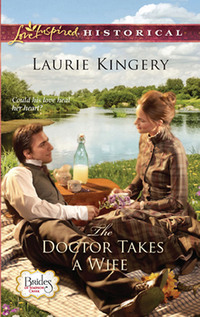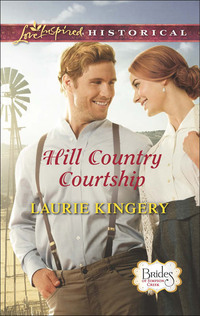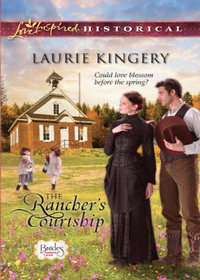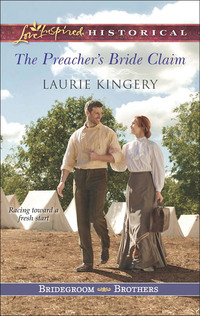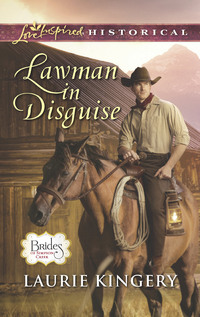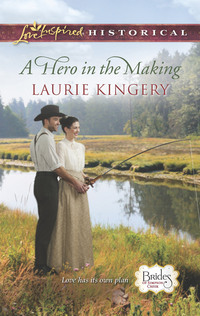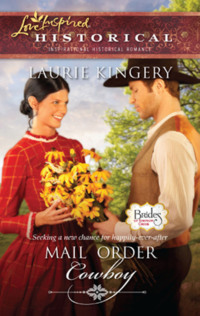
Полная версия
Hill Country Christmas
She could hardly believe her ears, and her eagerness had her rushing forward as fast as she had been backing up. “My father? You know my father? Is he coming? When will he be here? Why didn’t he come with you? Oh, I knew he’d be back someday!”
A cloud seemed to pass over Tucker’s face, and he put out a hand, not to touch her but to stop the flow of her words.
“He…he’s not coming, Miss Keller. I’m sorry, I should have made that clear right off. I-I’m sorry to have to be the one to tell you he’s dead.”
Delia felt the earth shift beneath her feet as if she had been whirled around a dozen times and let loose. She would have fallen if the stranger hadn’t put out a hand just then to steady her.
“Easy there,” Jude Tucker murmured, his touch gentle. “You’re white as bleached bones, Miss Keller. Why don’t we step up onto your porch and sit down on those chairs? I’ve given you a shock, ma’am, but I reckon you’ll be wanting to hear the rest once you’ve had a few moments to think.”
She didn’t remember giving permission, but with his hand on her elbow, he guided her up the three steps and settled her into the rocker that had been her grandpa’s favorite place to while away an evening. He watched as she untied her black bonnet and set it on the small table between them.
“Is there a pump around back? Could I fetch you a cup of water?” Tucker asked.
His voice seemed to come from a long way off, and Delia had to force herself to make sense of his words before she could answer him. “A pump? Water? No…That is, yes, there’s a pump, but no, I don’t want any….”
Then, as the result of years of modeling herself after her grandpa, who’d never done the least thing without thinking of other people first, she added, “Oh, but feel free to help yourself, if you’re thirsty. There’s a cup hanging by a string from the pump.”
He looked surprised. “It’s mighty nice of you to be askin’ at such a time, ma’am. Perhaps I’ll do that, after I’ve told you about why your father sent me to see you.”
“What…what happened to my father?” she said, swallowing past a lump in her throat, her eyes burning as she struggled to focus on the stranger.
Jude Tucker looked down at the hat he held between his long, tanned fingers. “He died mining silver out in Nevada, Miss Keller,” he said.
When she said nothing, merely waited, he looked up at her, then went on.
“You probably know they struck silver out there in ’59, long before he got there, but your father discovered a new mother lode nearby. I’d been helping him mine it. He’d been lucky—luckier than anyone’s been since the Comstock Lode. He’d been saying he was going to head back to Texas, but before he could there was a mine collapse. I’d gone to town for supplies with the wagon, and he’d gotten pinned under a couple of big beams for several hours. He…”
Tucker paused, then seemed to think better of what he was going to say. His eyes shifted toward the road, but Delia could tell he wasn’t really seeing anything. He was remembering.
“It was clear he was in a bad way when I got there. I pulled the beams off him. I was all for trying to get him to the doctor, but he wouldn’t go. He told me he knew he was dying. There probably wasn’t anything the sawbones could’ve done anyway, and the ride would have killed him. He told me just to let him lie there so he could use the moments he had left to tell me where to find you, Miss Keller. He was gone just a few minutes after that.”
Delia felt a hot knife of regret stab her. If only her father hadn’t been so restless—if only he hadn’t felt that need to go seek his fortune. He’d be alive today, and she wouldn’t have had to grow up without a father. Mrs. Calhoun had been unknowingly right when she’d quoted that verse from the Bible. The love of money had certainly been the root of evil for Will Keller.
“And now you have,” she said, remembering her manners. “It was good of you to come so far, Mr. Tucker, to tell me about my father’s death. I…I don’t have any way to repay you for your trouble.”
Something shifted in the depths of those steely eyes. “You’re welcome, but I…didn’t come all this way just to inform you of his death. I came to bring you something. You’re his only living heir, after all.”
“Heir?” Once again, it was as if he was speaking a foreign language.
His lips curved upward slightly. “Well, I suppose heiress would be the proper word, ma’am. In my saddlebags I have a certificate from the bank in Carson City that you can have transferred to your bank here in town.”
“Certificate? What do you mean?”
“Your father had already mined quite a lode of silver before anyone—anyone besides me, that is—got wind that he’d struck such a big vein. He converted it to cash and put that in the bank. He died a rich man, Miss Keller. And now all his wealth is yours.”
He’d been afraid that the news might cause her to faint for real this time. Jude watched, ready to catch her, as the heavy dark lashes flew up and surprise siphoned the blood once more from her cheeks, but Delia Keller remained upright.
A soft gasp escaped her lips. “Rich? My father? And he left it all to me?”
Her incredulity at being the sole beneficiary surprised him in turn. “You were his only child, Miss Keller. Who else should he leave it to?”
“I…I don’t know,” she stammered in bewilderment. “As long as he’d been gone from here, I thought it possible that he might…well, have married again. Maybe even started a new family somewhere.”
Jude wished his friend were alive again, if only for a moment, so he could upbraid him for deserting his responsibility to his only child and making this beautiful woman doubt her importance to her father. Compared to that, even the thousands of dollars Will Keller had left her were fool’s gold.
“Or he could have left it to you, his partner.” She’d been looking down at her lap, but now he found those green eyes trained right on him.
Jude found himself unable to meet her frank regard. “I…I wasn’t his partner,” he explained. “I just worked for him. He found the silver all by himself. He gave me plenty for traveling expenses, Miss Keller. That was enough.”
“You could have kept the certificate and claimed you couldn’t find me. No one would have been the wiser.”
Those eyes seemed to bore right through him, straight to his soul.
“No, I couldn’t have,” he said, wondering what Delia Keller looked like clothed in some color other than black. Green perhaps, to match her eyes. Now, that would be a picture. “Besides, what would I do with so much money? I go where the wind takes me.”
“You’re a drifter?”
It was phrased as a question, but it wasn’t one. Jude knew she had sized him up when he’d asked for directions yesterday—or if she hadn’t, the sour-faced woman next to her had done it for her.
“You don’t want to settle down somewhere, Mr. Tucker? Put down roots, make a home?”
He had to quell her inquiries before he ended up saying more than he meant to. Jude gave her a direct look, a look that was a little too bold, a look that said she didn’t know him nearly well enough to be asking such a personal thing.
“The question is, what are you going to do with it, Miss Keller? That’s what you need to be thinking of.”
He saw the flush sweep up her neck and into her cheeks and knew she’d gotten the message he intended.
“Oh! I…I suppose you’re right….” A parade of emotions played across her face as he watched, from astonishment to thoughtfulness to amusement.
“Well, this does change things, doesn’t it? I was on the way to town to sell my eggs so I’d have enough to buy sugar, and I thought while I was there I’d see about getting a job. I thought I’d better start saving some money for when the new preacher arrived and I had to find a new place to live.”
He laughed. “You won’t have to do that now, Miss Keller.”
She smiled, a smile of dawning confidence. “No, I won’t, will I? I…I can buy a house if I want to, can’t I?”
He nodded, amused. She really had no idea, just yet, of just how wealthy she was. “Miss Keller, with the wealth represented by that certificate, there, you can have a house built to your exact specifications. It could be the biggest house in Llano Crossing, if you wanted. Or you could move anywhere you like.”
“I—I see,” she breathed. “Well! That does give me something to think about, doesn’t it?”
A gleam flashed across those clear green eyes. Delia Keller looked as if she’d thought of something very satisfying. Jude wondered for a moment what it was.
“What do you suggest I do first, Mr. Tucker?” she asked.
“You said you were going to town. You should still go, and right away. Get that certificate into the bank safe before you tell anyone—and I mean anyone—about it.”
She looked startled at his sudden grimness.
“Mr. Tucker, this is a small town, full of good people, not swindlers and cardsharps. It’s not as if someone would snatch it out of my hand,” she protested.
“You asked my opinion, Miss Keller,” he reminded her. “All I’m saying is, go to the bank first, before you speak to anyone about what I’ve told you. After that, you can sit up on the roof of the town hall and call out the news from there, if you’ve a mind to.”
Jude could see his blunt words had splashed cold water on her bubbling excitement, which was as he’d intended. A little caution would serve her well.
“Very well. I’m sure it’s good advice,” she said. “Would you suggest that I not mention it to anyone afterward, either? Other than the bank president, I mean—he’ll have to know because I’ll have to tell him how I came by this certificate. But people will guess something has happened when I start looking for property….” Her voice trailed off and she looked at him uncertainly.
He managed not to laugh at her naiveté. “I think you’ll find that word will get around as if it had wings, Miss Keller. Be very careful. You’re going to find that the way people have treated you is about to change. Don’t trust everything that people say to you.”
She studied him for a long moment and looked as if she were about to ask him how he knew so much. But apparently, after the way he had responded to her other personal question, she decided against it, for she just nodded.
“I’ll do as you suggest,” she said, rising. “Perhaps you would accompany me, Mr. Tucker? The least I could do would be to buy you dinner at the hotel afterward, after the distance you’ve come to inform me of this…this astonishing change in my situation,” she said. She’d have to ask the bank president for an advance of cash in order to pay for the meal, of course, but that shouldn’t be a problem.
Chapter Three
He laughed, but this time it was a mirthless sound that stung her pride. “Miss Keller, you’re a rich woman now, but you still need to be careful of what people will say. Being seen with a stranger—especially being seen dining with me—would not be good for your reputation.”
She hadn’t thought of that, but was determined to persuade him. “If I introduce you—if I explain that you were my father’s friend and came here to inform me of his death—I’m sure no one would think ill of it.”
He shook his head. “That wouldn’t make a difference,” he said. “In fact, it might make things worse. No, you’d do better to pretend we never met—other than yesterday, of course, when I asked for directions. That wasn’t exactly a formal introduction.”
“But what will you do? Where will you go from here?” she asked. She’d wanted to hear more from this man about her father—and, if she were honest with herself, she wanted to spend a little more time in the company of Jude Tucker, though she couldn’t have said why. There was just something about him. Perhaps it was only because he had brought the news that had just changed her life.
For a moment, he looked as if he was going to ask her why she cared enough to ask. Then he said, shrugging, “I don’t know. I’m a fair enough carpenter…. I’ll probably stick around town awhile, do some odd jobs to build up a stake so I can go back out West.”
“It’s honest work,” she murmured.
“It’ll take a long time to earn enough that way.”
“If you’re in that much of a hurry, maybe you should rob the bank,” she suggested tartly.
“The same bank you’re about to go to? Not a very wise suggestion, Miss Keller.”
She stiffened at his teasing. “I’m just going to take these eggs back into the kitchen, and then I must be going,” she said, going to pick up the basket she had left by the gate. “Good day, Mr. Tucker. Thank you for your kindness in coming, and for your honesty in bringing me my father’s legacy.”
“Goodbye, Miss Keller,” he said, donning his hat again and pulling it low, so his eyes were in shadow. “Remember, if you see me around town, we haven’t met.”
His unnecessary reminder, and his failure to acknowledge her thanks, irritated her. “That won’t be a problem,” Delia said, her voice curt.
Tucker had been compassionate in the way he’d informed her of her father’s death, but after that he’d done nothing but make her feel like a gullible innocent. Very well! She had tried to show her gratitude and he’d virtually thrown the offer back in her face—even made her feel that, by offering, she had seemed a little forward.
He was gone when she came back out, and she resolved to put Jude Tucker from her mind. With any luck, she wouldn’t encounter him again, and she could concentrate on the message he had brought, rather than the messenger.
Her father was dead. It was strange, Delia mused as she walked down the road, but after the initial stab of grief, she felt…nothing. Perhaps, since he’d been gone without a word for so long, he had been dead to her anyway. Of course, Delia hoped he hadn’t suffered and that, in the time between the accident and Tucker’s return to the mine, her father had thought to pray.
He had believed in Jesus, Delia remembered. She recalled times he’d listened to her prayers and read her stories from the Bible. But that had been before her mother’s passing, which had set the wanderlust loose in his soul so badly that he couldn’t bide at home and be a father to her.
Delia winced, remembering now how often she’d expressed anger toward her father when talking to her grandpa.
“Delia, darlin’,” she could hear him say in his drawling voice, rusty with age, “it’s plumb understandable and human that you feel that way, but you’d do better to pray for him, for his safety and his quick return. Let’s read that story in the Bible about the Prodigal Son. Maybe your papa will be just like that, and we’ll have a feast to celebrate.”
Surely it was a sin to be angry toward the dead. Her father was no longer capable of coming back to her.
But what about my prayers, God? I prayed for Papa’s safety and his return, and You let him die in a mine collapse, hundreds of miles away.
“God always hears us, child,” she could hear her grandpa say, as clearly as if he had been right there by her, “but sometimes his answer is no. And sometimes we won’t ever know—this side of Heaven, at least—why that’s so.”
And now that I’m a rich woman, it’s too late for me to help Grandpa with my money. How wonderful it would have been if she could have used some of it to buy him some comfort in his old age. She’d have insisted he move into her new house with her, or if he hadn’t been willing, she could have at least had the tumbledown old parsonage fixed so that its roof no longer leaked and its walls were freshly painted.
He’d probably have insisted she send the money to missionaries in Africa instead, Delia mused, and found her cheeks wet with tears. She could mourn her grandpa, even if she couldn’t feel deep sorrow for her father.
The town of Llano Crossing lay just around a wooded bend from its church and parsonage. Jude Tucker tied his horse among the cottonwoods that lined the curve of the river and followed Delia on foot, keeping his distance among the trees so she wasn’t aware of him. He was pleased to see that true to his instruction, she went straight to the bank without dillydallying to chat with any of the handful of townsfolk who greeted her in passing.
He hadn’t expected Delia Keller to be a beauty. Nothing her father had told him while they worked shoulder to shoulder in the mine, or later, when Will lay dying in the wreckage of that same mine, had prepared Jude for those large green eyes, that slender, slightly long nose, that rosebud of a mouth, all set in a heart-shaped face with a faint sprinkling of freckles. He supposed that when Will had last seen his daughter before heading West, Delia had been at that awkward, coltish stage that many girls go through just before being transformed into beauties.
He doubted that Delia even knew she was pretty. There was something unawakened, unaware in those clear green eyes. Her gaze had been direct when she had invited him to escort her to the bank and to buy him dinner. Perhaps it was because he had just told her of her father’s death, but Jude was used to women who knew how fluttering their eyelashes just so at a man would get them their way.
There was also a total lack of vanity in the ugly high-necked black mourning dress she wore. Maybe the dress was borrowed. He had known women who looked striking in black, but Delia wasn’t one of them. The harsh, flat hue leeched the color from her cheeks—and yet somehow she was still beautiful.
Now that she was wealthy beyond most women’s dreams, though, she could at least improve the quality of her mourning. She could buy dresses in finer fabrics, black mourning jewelry and fetching hats to replace that ugly poke bonnet….
Better clothing, along with her change in status from an impoverished orphan to a wealthy heiress, would draw men like flies. He hoped Delia Keller had some shrewdness to go with her comeliness, or she’d find herself the victim of some smooth-talking fortune-hunter who’d treat her to a whirlwind courtship and then, as her husband, exert sole control over the money her father had wanted to benefit his daughter.
Lord, protect her. Make her as wise as a serpent yet harmless as a dove, as the Good Book says.
Will Keller had suggested that Jude be the one to marry and protect her, right after he had struck it rich. “You should go to Llano Crossing and marry my daughter, Tucker. She’s a sweet girl, my Delia. You’d be good for one another.”
He’d scoffed at Will for saying it. “Will, what does your daughter need with the likes of me? Besides, we’ll probably never meet. You’ll go home one day, now that you’ve made your fortune, and I’ll keep looking for a rich claim of my own.”
“Or a rich widow,” Will had joked, wiping the sweat out of his eyes.
Jude had only shook his head. He was done with widows—especially those who claimed to be widows who really weren’t at all. He’d settle down with a woman someday, he supposed. He wasn’t a good enough man to always resist the clamoring wants of his body forever. But he certainly wasn’t worthy of an innocent girl like Delia, a preacher’s granddaughter. Not after Nora.
“This is extraordinary news, Miss Keller,” Amos Dawson, the bank president, said, laying aside his wire-rimmed spectacles and the certificate Delia had shown him, and crossing his arms over his considerable paunch. “You’re saying you had no idea that your father had amassed such a fortune?”
“Yes,” she murmured, feeling uneasy at his staring. His black beady eyes reminded her of her grandpa’s old rooster—right before the bossy bird tried to peck at her legs. “I—I mean no, I had no idea. We—my grandpa and I—hadn’t heard from him in years, you see. We didn’t even know if he was alive or dead.”
“How did you get hold of this document? Did it come in the mail?”
Delia wanted to say it had, to avoid questions about Jude Tucker, since he had cautioned her not to claim any acquaintance with him. But it would be easy enough for Dawson to check with the gossipy postmaster of the little town, who knew who was receiving mail from where and didn’t mind telling anyone who asked.
“I…That is, the man who had been working for him brought it to me.”
Dawson continued to scrutinize until Delia felt a flush creeping up the scratchy neckline of her dress.
“We’ll have to telegraph the bank in Nevada to verify its authenticity,” he said at last.
Delia felt foolish. The bank couldn’t just assume the certificate was real and start issuing her funds based on it. The document could be a clever fraud.
“I…I assumed as much,” she said, trying to sound like a woman of the world. “Naturally.”
Dawson seemed pleased with her composure. “We’ll do so immediately, I assure you, Miss Keller. I would imagine it will take a few days to obtain an answer—but during that time, I regret that I can’t…that is, the bank cannot act on the basis of this document.”
Delia nodded. “I understand completely,” she said, rising. It wasn’t a problem. She had been poor when she woke up this morning, and she could go on pinching pennies and doing without for a few more days. She only wished she had brought those eggs after all—now she was going to have to walk back to the house and get them or do without sugar in her tea another day.
Dawson rose also. “Assuming this certificate is authentic, Miss Keller, this is very exciting news, isn’t it? Just wait until the word gets out!”
Delia felt a prickle of alarm dance up her spine. He was practically clapping his hands together with glee, as if he wanted to be the first to spread the news. “I hope I can rely on your discretion, Mr. Dawson. I…I wouldn’t want to be the subject of speculation…especially before the certificate has been proved genuine.”
Dawson coughed and took a step back, and his features smoothed out as if an invisible hand had wiped all expression from his face. “Of course not, Miss Keller. Rest assured. But only imagine the possibilities of what you will be able to do with such a sum! The bank will be pleased to be of any assistance to you that you would require.”
“Fine. Please let me know when you’ve received confirmation. Good afternoon, Mr. Dawson.”
She swept out, disturbed at the complete transformation in the way the bank president treated her once he had heard the news. No wonder Grandpa had never had much use for Amos Dawson!
Intent on her thoughts as she pushed open the ornate, heavy door of the bank, she nearly collided with Charles Ladley, the mayor’s son, who was just coming in.
“Why, hello, Miss Delia,” he greeted her, extending a hand to steady her. “I hope everything’s all right? Is there anything I can do for you?”
Delia felt a hidden amusement bubbling up within her at his concerned expression. He must think she was here to ask for a loan!
“Thank you, Charles. Everything is fine,” she said serenely. “It’s kind of you to ask.”
He studied her more closely. “That’s good, that’s good. You would let us know if you needed anything, wouldn’t you?”
Us meant the Ladleys, the pillars of the community.
“Of course I would,” she said. “Tell your mother I said hello.” She smiled and kept moving. It would be interesting to see how this man, on whom she had once pinned all her hopes and dreams, treated her, once he knew she was no longer the poor little church mouse.
Chapter Four
Positioned at a table by the window that faced the bank, Jude was just about to sink his fork into his savory beef stew in the Llano Crossing Hotel dining room when he spied Delia Keller exiting the bank. He straightened, seeing her almost run into the dapper man who then chivalrously kept her from falling. Jude noted, too, how the handsome swell’s hand lingered a moment longer than was strictly proper on Delia’s elbow.
Jude was surprised by the urge he felt to jump out of his seat and dash out the door, shouting a command for the other man to take his hands off Delia Keller. But then she smiled at her rescuer, and Jude ordered himself to remain where he was.
Obviously Delia knew the man who stared down at her so familiarly, so he needn’t interfere. Delia was in no danger, and the richly dressed fellow speaking to her was perhaps the very sort of man she should be associating with from now on.


